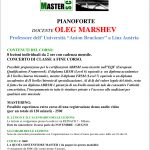DOMINION EVENING POST
Aug. 22, 2006
Sonata No 26 ‘Les Adieux’ (Beethoven); Three Piano Pieces, D 946 (Schubert); Rachmaninov: Corelli Variations, Op 42, Etudes-Tableaux, Op 39 Nos 1 and 2, Preludes Op 23 Nos 2 and 5
Oleg Marshev told Charlotte Wilson on Concert FM’s Upbeat on Tuesday that this was his fifth tour of New Zealand; each managed by that model impresario Helen Collier of Taihape. Each tour involves performances in many, mainly provincial towns: this time he will have given 12 performances.
One would not expect a pianist of Marshev’s calibre to undertake such a tour: he records for an international label and has played, inter alia, at the Lincoln Centre in New York and the Concertgebouw in Amsterdam; he is one of the most talented of the brilliant group of younger Russian pianists. But he simply said he enjoyed playing for two as much as for 2000.
Marshev has all the spectacular virtuosity you could wish for – see the Rachmaninov works in the second half of the concert – but most interestingly, he understands the nature of Schubert and the extent of the liberties he can take with dynamics, in distinguishing the layers of music from each other, in stretching the limits of rubato and rhythmic variety.
The Three Piano Pieces of Schubert’s last year emerged with stature comparable to the three great piano sonatas of later in that year. In particular, the second piece – the Allegretto – took on the character of a great if somewhat unorthodox sonata movement. The concert had begun with Beethoven’s sonata in which he described his leaving to escape Napoleon’s army’s advance on Vienna – one of the few of Beethoven’s works that tells a story. There was a particularly slow, reflective beginning, but in later passages Marshev brought sudden energy, romantic expressiveness and a varied and imaginative palette of colours.
Though the pairs of Rachmaninov’s Etudes-Tableaux and Preludes served well to display his range of his technical and interpretive powers, the major work was the Corelli Variations – on the once popular Iberian tune, La Folia.
Maintaining interest in the essentially simple tune is a great challenge to a pianist: in Marshev’s hands one was more aware of the encompassing shape of the work than with individual variations, which is how it should be.
In response to the highly appreciative applause, Marshev played three encores: Bach’s Organ Prelude in F minor arranged by Siloti, a Concert Galop by Emil von Sauer and Prokofiev’s piano -wrecking study No 4.


